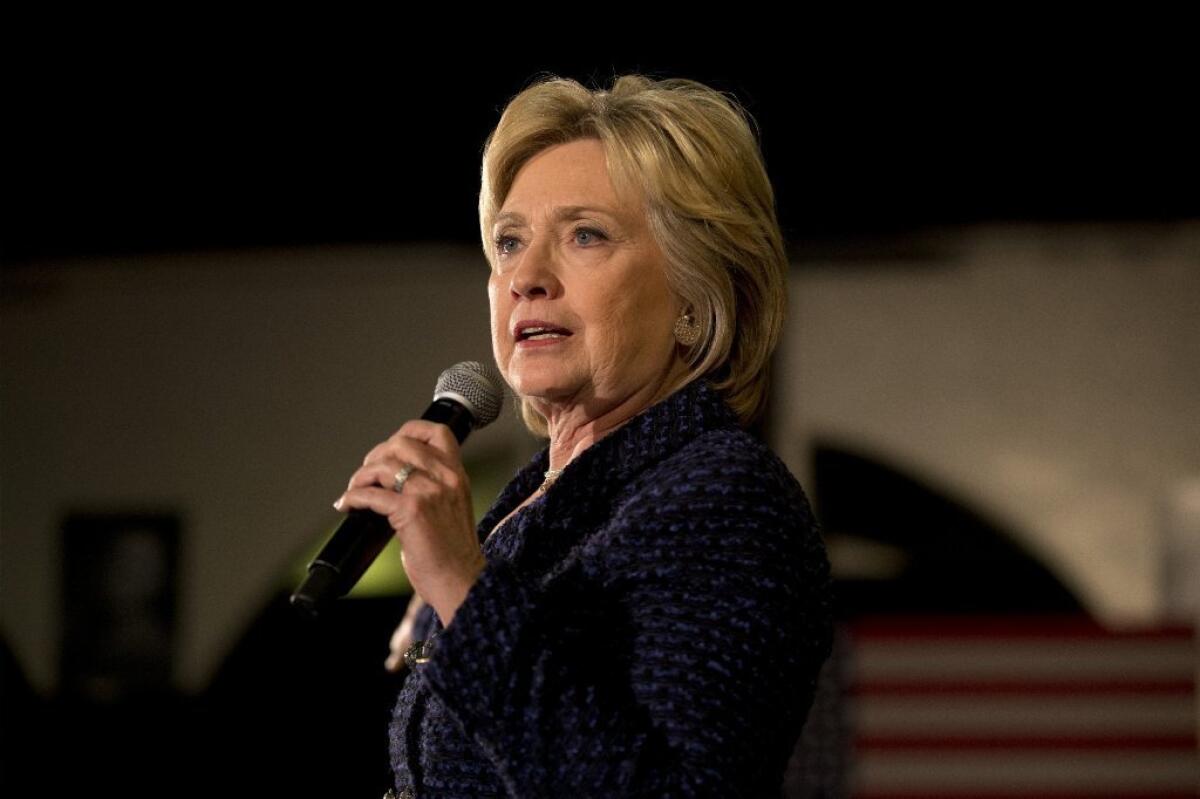Opinion: Hillary Clinton and Ted Cruz are making the Supreme Court a campaign issue

Hillary Clinton, shown at a rally in Iowa on Monday, wrote of a “make-or-break moment” for the Supreme Court.
- Share via
The last presidential election in which the future of the Supreme Court was a major issue was, arguably, 1968. In that campaign, Nixon assailed the Warren Court and other courts for “weakening the peace forces as against the criminal forces”
More recently, as one scholar put it, judicial issues “produce much campaign bluster but .... affect few ballots.” But that hasn’t stopped presidential candidates from putting the court at the center of their campaigns. This year is no exception.
In an op-ed piece in the Boston Globe last week, Hillary Clinton noted that on Election Day “three of the current justices will be over 80 years old, which is past the court’s average retirement age. The next president could easily appoint more than one justice. That makes this a make-or-break moment — for the court and our country.”
Using code language, Clinton intimated that she would appoint justices who would be pro-choice on abortion, supportive of gay rights and likely to overturn the Citizens United decision:
“I’ll appoint justices who will protect the constitutional principles of liberty and equality for all, regardless of race, gender, sexual orientation or political viewpoint; make sure the scales of justice aren’t tipped away from individuals toward corporations and special interests; and protect citizens’ right to vote, rather than billionaires’ right to buy elections.”
(Clinton is being more circumspect than her husband, who said flat-out in 1992 that “I will appoint judges to the Supreme Court who believe in the constitutional right to privacy, including the right to choose.”)
On the Republican side, Sen. Ted Cruz, a former solicitor general of Texas and Supreme Court law clerk, said in an interview, “I will be willing to spend the capital to ensure that every Supreme Court nominee that I put on the court is a principled judicial conservative.”
Expressing grudging admiration for Democratic presidents who had picked liberal justices, Cruz complained: “The Republicans have an abysmal record. We bat about .500. About half of the nominees Republicans have put on the court have not just occasionally disappointed but have turned into absolute disasters.”
Should Clinton and Cruz be criticized for applying a “litmus test” to Supreme Court appointments? Yes and (mostly) no.
Given the life tenure and longevity of Supreme Court justices, it’s a mistake for a president (if not for a presidential candidate) to focus exclusively on whether a nominee can be expected to vote the right way on the hot-button issues of the day. A justice appointed in 2017 could still be serving in 2050; in that distant future the court’s docket might be dominated by issues no one is thinking about today.
That argues for presidents to consider not only a potential justice’s views about current issues but his or her intelligence, erudition and cast of mind. Even the much-ridiculed “empathy” is a legitimate qualification.
Also, Clinton and Cruz may be undermining the credibility of their future appointees by implying that they would be putty in the hands of the presidents who appointed them. Even justices who generally share the legal philosophy of the presidents who chose them sometimes “rebel.” Look at the votes Justices Sonia Sotomayor and Elena Kagan cast against the Obama administration on religious freedom and the president’s power to make recess appointments.
But even if Cruz and Clinton are being crass in the way describe the process of choosing justices, their general point -- that presidents will try to choose like-minded justices -- is valid. Presidents in previous generations may have subordinated judicial philosophy to factors such as religion, party loyalty, ethnic politics or geography, but in recent decades they generally have prioritized judicial philosophy (even if they ended up guessing wrong about how an appointee would rule).
Voters should know what a presidential candidate seeks in appointments to the court, so that they can cast their ballots accordingly. But if the recent past is any guide, they’ll have their minds on other things.
Follow Michael McGough on Twitter @MichaelMcGough3
More to Read
A cure for the common opinion
Get thought-provoking perspectives with our weekly newsletter.
You may occasionally receive promotional content from the Los Angeles Times.











